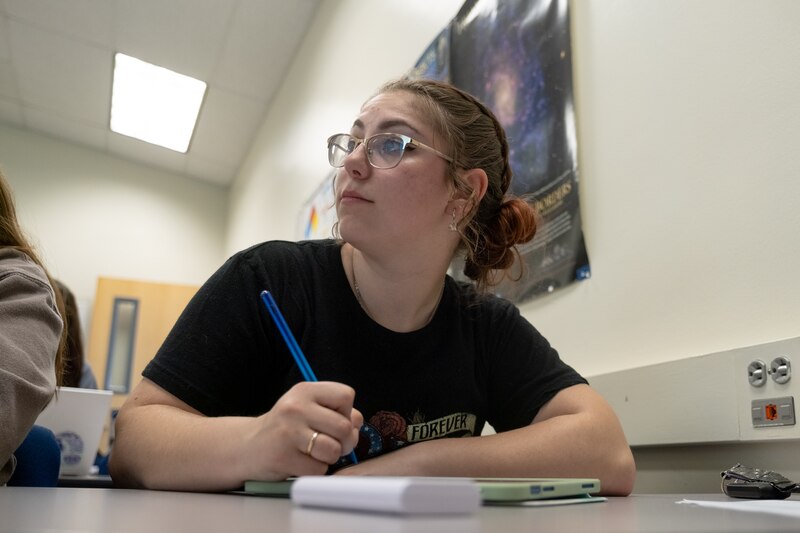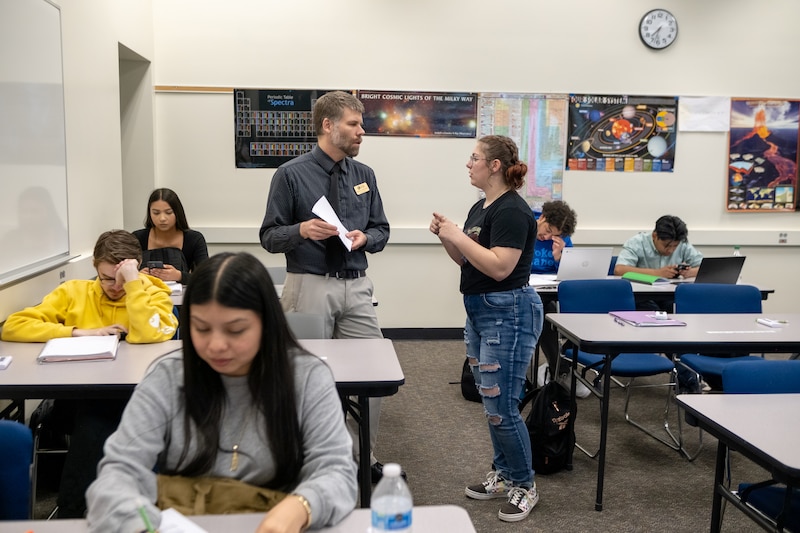Join our free month-to-month e-newsletter Past Excessive Faculty to get the newest information about school and profession paths for Colorado’s highschool grads.
The routes to two- and four-year faculties didn’t match Maryssa McCray’s ambitions.
McCray, 19, desires to be an officer within the Air Power. However her SAT rating wasn’t excessive sufficient to enroll within the U.S. Air Power Academy in Colorado Springs. Life occasions additionally bought in the best way. Her Kia Sportage bought stolen. She additionally skilled the shock of her household needing to place down two of their canines.
When she heard in regards to the ASCENT program from her Rangeview Excessive Faculty counselors, she jumped on the probability. This system extends highschool by a fifth yr, however permits college students to attend school in that fifth yr. She enrolled on the Group Faculty of Aurora as she discovered learn how to be part of the Air Power.
“I wasn’t essentially prepared to depart my household, so it form of gave us each a bit of bit extra time to get located,” she mentioned.
For college kids like McCray, Colorado has provided quite a few college-level alternatives, sometimes freed from value, whereas they attend highschool. Some choices introduce college-level courses as early as ninth grade. Others, like ASCENT, pay for college kids to attend school on campus for gratis and might help forestall them from dropping out of highschool.
However state lawmakers at the moment are digging deeper into the worth and outcomes of those applications after a activity pressure highlighted issues like a scarcity of cohesion with these applications. Throughout this yr’s legislative session, lawmakers positioned an enrollment cap on ASCENT, which stands for Accelerating College students by means of Concurrent Enrollment, as a part of broader efforts to scrutinize this system and others that give college students school and workforce expertise.
Whereas lawmakers say they’re devoted to workforce and school applications in highschool, ASCENT has confronted maybe essentially the most skepticism due to the minimal knowledge about it and its rising prices as extra college students take part.
It’s one of many state’s oldest concurrent and twin enrollment applications; lawmakers created ASCENT in 2009. But there’s nonetheless not quite a lot of details about the courses college students absorb school, whether or not they go away with a credential or diploma, or whether or not college students enter into good-paying careers, partly as a result of accumulating this knowledge isn’t required.
Nonetheless, the data that’s out there suggests ASCENT isn’t fulfilling its unique mission to the extent individuals hoped. Initially aimed toward serving to college students who would possibly in any other case lack entry to varsity, akin to college students with out documentation, knowledge exhibits that half of contributors are white and three-quarters are middle-class.
District leaders say there’s worth in ASCENT, even when different applications overlap considerably with the expertise college students get. However others fear in regards to the expense and an outdated mission that doesn’t align with workforce targets.

For college kids like McCray, this system allowed her time to determine her subsequent steps, as a substitute of constructing a university resolution that didn’t match or not going to varsity in any respect. She’s unsure what she would have executed with out this system.
“I knew not less than for a yr I can get by means of school, be taught what I need to do and get used to it, after which determine issues out from there,” McCray mentioned.
Colorado report highlights fragmented twin enrollment choices
About 90% of jobs that may assist a household of three require a postsecondary training, akin to a certificates or diploma, in accordance to a current state report.
But current commencement knowledge exhibits solely about half of all Colorado highschool graduates will head to varsity. Lots of them — particularly Black, Hispanic, and Native American college students — won’t ever end school or enter a workforce coaching program.
In response, Colorado has pushed school programs all the way down to highschool college students to assist them get school expertise, a workforce credential, and even graduate with a better training diploma. Or within the case of prolonged highschool applications, like ASCENT, the state has provided to pay for a pupil’s first yr or years in school.
However a report launched in December by a state activity pressure detailed a fragmented early profession and school system that’s in want of streamlining.
Colorado has a dizzying variety of such alternatives for highschool college students. The crowded panorama could cause confusion.
Every program is distinct, and never all of them are administered by the identical workplace. That may make it troublesome for households and college students to grasp their choices.
The completely different applications even have disparate reporting necessities, creating difficulties for measuring how applications are working as a complete and individually.
Colorado lawmakers mentioned the duty pressure’s report, which they approved, outlined a path to
ward extra accountability and would assist them perceive what’s and isn’t working for college kids.

Colorado lawmakers halt ASCENT’s enlargement
Lawmakers enacted a sequence of payments this yr to broaden and consider school and workforce education schemes after the report.
The payments direct the state to do a complete monetary examine to research how a lot the applications value the state and districts, compile long-term knowledge on program outcomes, broaden alternatives, and search to discover a complete route on the subject of school and profession training.
The expansion — and the value tag — of ASCENT specifically raised lawmakers’ eyebrows.
Colorado had spent about $3.8 million a yr on this system previous to 2022. That yr, within the title of accelerating alternatives for college kids statewide, lawmakers lifted a 500-student cap for ASCENT.
That’s led to speedy development for ASCENT. Subsequent yr, 1,700 college students are anticipated to take part, up from 1,200 this yr. As extra of them have jumped on the probability at free school,
the state is projecting it is going to spend about $17 million on ASCENT subsequent yr, greater than quadruple what this system value in 2022.
Lawmakers determined this yr to cap this system at subsequent yr’s pupil enrollment ranges, and a fiscal evaluation says adjustments will carry down prices by about $1 million. In addition they accepted a ma
ndate for college kids to fill out the Free Software for Federal Pupil Assist, often called the FAFSA. That might offset among the state’s prices if college students are eligible for and obtain federal grants.
The brand new legislation additionally mandates additional examine of this system’s value and outcomes.
Many ASCENT college students enroll at neighborhood faculties in Colorado, which prices about $4,692 for full-time enrollment of 30 credit score hours a yr. But the state supplies about $10,000 a yr to districts for each pupil within the ASCENT program. Other than tuition, the funding covers districts’ administration of this system. However that hasn’t assuaged officers’ considerations about prices.
“There are legitimate questions on whether or not this program is definitely serving to the scholars it’s supposed to assist,” mentioned Rep. Shannon Fowl, a Westminster Democrat and Joint Funds Committee chair, throughout a ground listening to on the invoice that focused ASCENT. “And we have to ensure that we get the largest return for each greenback we spend.”
ASCENT helps college students get school expertise
The ASCENT program helped Jennifer Martin discover her footing in school.
Martin, 19, virtually took a spot yr after she graduated from Aurora’s Gateway Excessive Faculty in 2023 as a result of she didn’t really feel prepared for faculty and apprehensive about the fee.
Nonetheless, counselors helped persuade Martin to take part in ASCENT, which would offer assist from Aurora Public Faculties throughout her yr on the Group Faculty of Aurora.

“My mentality was to avoid wasting up sufficient cash to the place I may afford the schooling and pay for the prices of dwelling on campus,” she mentioned.
However different applications would possibly obtain the identical purpose whereas providing a clearer focus.
Michelle Romero, the postsecondary & workforce readiness director for the Colorado Division of Training, mentioned newer prolonged highschool applications which have come after ASCENT steer college students into particular careers.
For instance, the P-TECH program started in 2016 and in addition provides college students the choice of extending highschool enrollment. However it’s designed to get college students right into a science, expertise, engineering, or math pathway in ninth grade. This system affords six years of highschool, and permits college students to graduate with an affiliate diploma in a related discipline. Some P-TECH college students have graduated in 4 years and by no means wanted extra time in highschool, Romero mentioned.
In the meantime, the state’s Trainer Recruitment Training and Preparation program began in 2021 to assist tackle the state’s trainer scarcity. This system additionally extends highschool enrollment. It pays for college kids who need to grow to be lecturers to take school courses for as much as two years.
ASCENT college students, then again, can take whichever school courses they need. And the state doesn’t even observe in the event that they keep in school past their ASCENT yr.
When discussing ASCENT pupil outcomes, Romero mentioned: “Do they keep on with a sure pathway? Do they end? Do they find yourself with some sort of credential, affiliate certificates, or do they then switch to a 4 yr? I couldn’t inform you.”
Colorado educators give ASCENT blended evaluations
Invoice Summers, Cañon Metropolis Excessive Faculty principal, had about 30 college students in ASCENT this yr. Subsequent yr, he initiatives participation will greater than double to 70 college students. However he mentioned it’s laborious to judge if ASCENT is placing college students on a path to a very good profession and financial mobility.
“It may be each a criticism and reward that college students are allowed to take no matter they need, which is nice for experimenting or seeing what a pupil desires to do,” he mentioned of ASCENT. “However are college students simply losing their time taking programs that they don’t want? Or is it truly going to offer them a profit?”
Dave West, director of school and profession success for Aurora Public Faculties, sees the aim of concurrent enrollment applications in a different way. Three-quarters of Aurora college students are from comparatively low-income backgrounds, and West mentioned ASCENT and different applications assist these college students understand their school desires.
“For me, concurrent enrollment is about opening alternatives and extra doorways that our college students could not even understand at this time limit exist,” he mentioned.
Though it’s not required by the state, Aurora Public Faculties makes use of ASCENT funding to pay college students’ school charges and supply them with a stipend for books.
West mentioned he understands this system is expensive, however hopes lawmakers work with districts in crafting subsequent steps for ASCENT. College students who’ve experiences like McCray and Martin present it may be efficient, he mentioned.

Martin will graduate from the Group Faculty of Aurora within the fall along with her affiliate diploma and plans to go to the College of Denver. McCray graduated along with her affiliate diploma in science this spring. She is going to quickly enlist within the Air Power.
“It helped me work out the place I wished to go,” McCray mentioned about ASCENT. “I bought my associates and that seems like such an accomplishment. Like, I’ve truly executed it.”
Jason Gonzales is a reporter masking greater training and the Colorado legislature. Chalkbeat Colorado companions with Open Campus on greater training protection. Contact Jason at jgonzales@chalkbeat.org.

